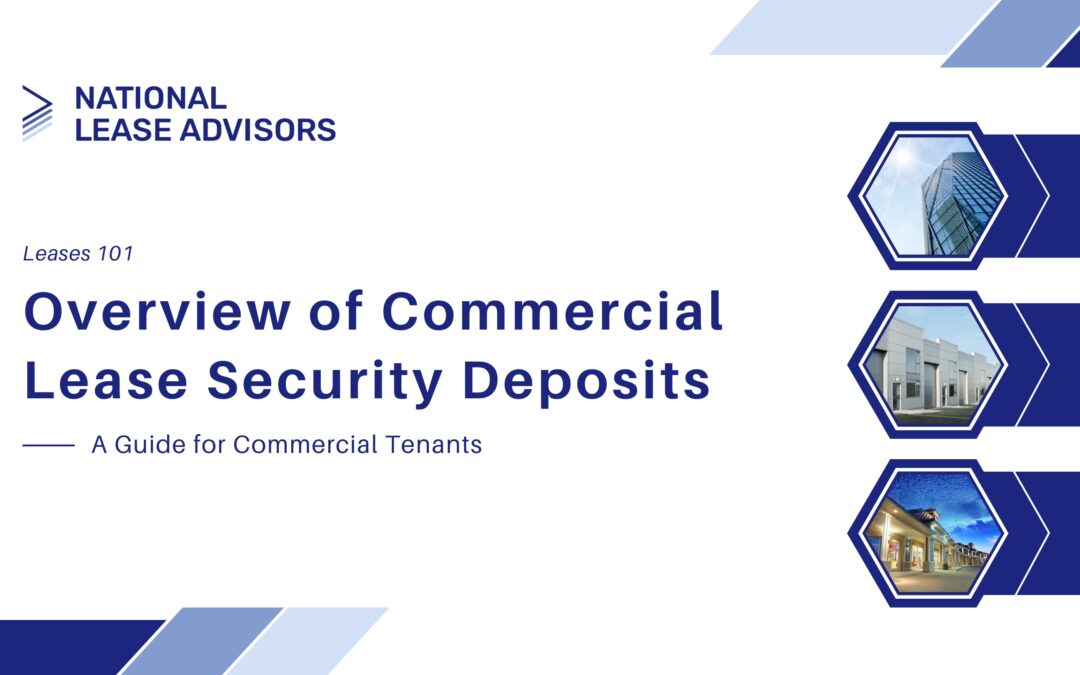As a lease administration company, we see many leases and many different security deposit structures. Below is an overview of security deposits, different factors that determine security deposit form and amount, and return of the security deposit at the end of the term.
Security Deposit Basics
A security deposit is an upfront payment made by the tenant to the landlord at the commencement of a lease agreement. It serves as a financial cushion to protect the landlord against various potential risks, such as property damage or rent default. Unlike residential leases, where state laws often regulate the amount and usage of security deposits, commercial leases offer more flexibility and are negotiable between the parties involved.
Why Do Landlords Require Security Deposits?
The most obvious reason landlords require a security deposit is to have a financial safety net. Running a commercial property comes with its share of unpredictabilities, such as sudden vacancies or unexpected maintenance costs. A security deposit provides some level of assurance.
Additionally, when tenants agree to a security deposit, it often signifies a commitment to maintaining the property and complying with lease terms. This commitment can be particularly crucial for landlords when they are dealing with new businesses with little to no financial history.
What Factors Determine the Security Deposit Amount?
Security deposits are negotiated between the landlord and can range based on a number of factors.
- Tenant Creditworthiness – Landlords will typically assess the financial health of a business before setting the security deposit. A business with strong financials and a solid credit history may be able to negotiate a lower security deposit.
- Amount of Lease Incentives Provided – If a landlord provides incentives to the tenant to lease their space, such as a tenant improvement allowance or free rent, then they may require a larger security deposit amount to ensure those incentives have financial backing from the tenant.
- Market Conditions – Prevailing market conditions can also play a role. In a landlord’s market where demand for commercial space outstrips supply, landlords might feel more comfortable asking for a larger security deposit. Conversely, in a tenant’s market, businesses might be able to negotiate a smaller deposit.
- Type of Business – The nature of the tenant’s business can also affect the security deposit amount. For example, manufacturing facilities that use heavy machinery may require a larger deposit compared to a software company with minimal impact on the premises.
- Additional Guarantees – In some cases, landlords may be willing to reduce the deposit amount if the tenant can provide other forms of assurance, such as a corporate or personal guaranty.
What are the Common Types of Security Deposits?
- Cash Security Deposit – A cash security deposit is cash provided to the landlord at the beginning of the lease term. Following the conclusion of the lease, the deposit is returned to the tenant, subject to the terms of the lease.
- Letter of Credit – A letter of credit is a financial instrument negotiated with the tenant’s bank that guarantees the rent payments up to a certain amount, typically in lieu of a cash security deposit.
- Corporate Guaranty – A corporate guaranty is a legal commitment where a legal entity agrees to be responsible for the obligations of the tenant entity.
- Personal Guaranty – A personal guaranty is a legal commitment where an individual agrees to be personally responsible for the obligations of a business. In the context of a commercial lease, a personal guaranty means that if the business fails to meet its lease obligations (e.g., paying rent), the individual who has provided the guaranty is personally liable.
How Much of the Security Deposit will be Returned?
The amount returned will depend on the terms of the lease. Security deposits are primarily meant to back the financial obligation of the tenant. Generally, unlike residential leases, commercial leases will provide for the condition of the space to be returned in the same condition as the start of the lease with “ordinary wear and tear excepted.” That means that unless the space is left with significant damage, small wear (such as the need for carpet to be replaced) will not be deducted from the security deposit amount.
When will the Security Deposit be Returned?
Clients will usually receive the security deposit back within 30-60 days of the end of their lease. It’s important for the tenant to request the deposit from the landlord as a landlord may not be proactive in returning the deposit.
Summary
Security deposits in commercial leases play a vital role in establishing trust between landlords and tenants while providing a financial and legal cushion against unexpected events. They come in various forms, each with its advantages and drawbacks. Both landlords and tenants should carefully consider the type and amount of the security deposit, bearing in mind the unique circumstances of the lease and the property involved. As always, consult with legal, real estate, and financial advisors to fully understand the implications of the security deposit in your commercial lease agreement.
About National Lease Advisors: National Lease Advisors is a leading provider of lease administration services, specializing in helping businesses effectively manage their real estate portfolios. Their comprehensive range of services includes CAM reconciliation reviews, lease audits, rent statement analysis, and lease accounting. With a focus on quality service and client satisfaction, National Lease Advisors helps clients manage their lease portfolios effectively, reducing costs and optimizing their real estate strategy.

